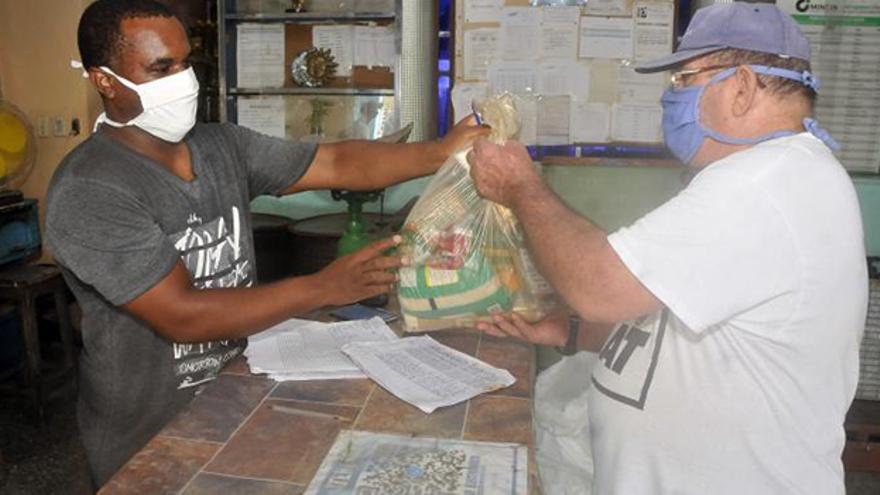
![]() 14ymedio, Havana, 3 May 2023 — On Tuesday in Santiago de Cuba a shipment of 30,000 food packages arrived, which the authorities plan to allocate to the most vulnerable families in the province. The local press pointed out that the packages were made with “donations from solidarity countries,” but did not say which ones.
14ymedio, Havana, 3 May 2023 — On Tuesday in Santiago de Cuba a shipment of 30,000 food packages arrived, which the authorities plan to allocate to the most vulnerable families in the province. The local press pointed out that the packages were made with “donations from solidarity countries,” but did not say which ones.
The distribution will begin in the José Martí District, a neighborhood of the provincial capital that presents one of the most serious situations in terms of food, in addition to numerous squatters. Then supplies will be sent to the main municipalities and other emergency areas, according to the merchandise director of the Internal Trade Business Group, Leonardo Lamela.
Each package consists of two kilos of rice, legumes, spaghetti and elbow pasta, as well as two cans of sardines, Lamela said in an interview with the Cuban News Agency (ACN). The social workers of each popular council will make a list of the possible beneficiaries and, through the warehouses, will deliver the packages.
The authorities will give priority, he said, to the most precarious cases they have registered: 1,938 pregnant women, 22,301 disabled or in need of some type of assistance and 1,154 children with low weight. Bárbara Rodríguez, mother of a child with a disability, celebrated the “gratification” represented by the packages, which arrived at a time of maximum crisis in which the indispensable food to support her child has reached prohibitive prices.
However, Rodríguez reminded the press that the packages “do not meet all the needs of a household,” although “they do alleviate the monetary burden in terms of family support.”
With the news that, as of May, Cubans over the age of 13 will no longer receive rationed chicken, the situation became even more precarious. Other foods, such as eggs and oil, have been on the “disappeared” list for months.
Many Cuban families have crossed the threshold of poverty and food insecurity. Last April, the World Food Program put numbers on the crisis: Cubans between the ages of 14 and 60 only cover 36% of energy intake, 24% of the daily protein ration and 18% of fats.
In an extensive report of the Global Network against Food Crises, published this Wednesday in collaboration with several United Nations agencies, a small section is dedicated to Cuba, which lists the problems faced by the Island since the COVID-19 pandemic.
“In 2022, the capacity to import critical foods and basic fuel products continued to be limited by high international prices, which reduced the supply and availability of agricultural inputs,” the report says.
It also notes that the Island has not yet been able to make up for the losses caused by the passage of Hurricane Ian in September 2022, which affected the province of Pinar del Río with losses in crops and infrastructure.
However, the maximum responsibility continues to lie with the poor economic management of the Government, which has systematically neglected its food strategy and decreased imports. Meanwhile, domestic production is still not able to alleviate the deficit that, for years, has plagued a country in which short-term solutions are no longer effective.
Translated by Regina Anavy
____________
COLLABORATE WITH OUR WORK: The 14ymedio team is committed to practicing serious journalism that reflects Cuba’s reality in all its depth. Thank you for joining us on this long journey. We invite you to continue supporting us by becoming a member of 14ymedio now. Together we can continue transforming journalism in Cuba.
